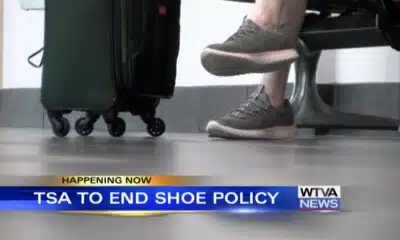Mississippi Today
How Mississippi’s troubled prison system has fared under Tate Reeves and Burl Cain

When Gov. Tate Reeves was sworn into office nearly four years ago, his very first priority was addressing the long-troubled Mississippi prison system.
Deadly riots at the Mississippi State Penitentiary and violence in other state facilities and how state leaders were struggling to address the situation became a major national story. And the Department of Justice had moved in with an investigation into the deplorable conditions and gang violence at four of the prisons.
Reeves, who as governor oversees the Mississippi Department of Corrections, focused on the crisis during his first State of the State address a couple weeks after he was inaugurated.
He vowed in that speech to shut down the worst of the worst, Parchman’s Unit 29, to stem the violence and chaos.
He didn’t.
Today, two-thirds of Unit 29 remains open. The man Reeves put in charge, Burl Cain, said there was no need to shutter the unit and that he could bring it back online through renovations and save the state money.
“I have absolute full confidence in Burl Cain’s ability to change the culture at the Department of Corrections,” Reeves said in May 2020 when he announced Cain’s appointment to oversee the prison system.
“I have absolute confidence he will do so in a manner to make Mississippians proud. I have zero reservations about appointing him,” Reeves said.
The 2020 riots might be over, but the deaths have continued.
Over 300 people have died in Missisisppi’s prisons since Cain became commissioner, with at least 50 of those deaths attributed to homicide, suicide and drug overdoses, according to records between June 2020 and September 2023 from the State Medical Examiner’s Office.
So what has Cain done as commissioner of the Mississippi Department of Corrections?
Mississippi Today, over the past two months, took a deep look at how the long-troubled prison system has fared over the past four years under Cain and Reeves. We interviewed people who are incarcerated, former staff, advocates who have been inside the prisons and state elected officials. We scoured through numerous state documents and reports and federal court filings, submitted open records requests and we spoke with prison officials.
What did we find? Mississippi’s prison system has made some gains, but there is more work to be done.
Incarcerated people still live among crumbling infrastructure. Getting people to work in the prisons continues to be an uphill climb. Gangs continue to hold power over inmates and staff. Efforts to prepare people to return to their communities after incarceration may not be enough.
“Time is short,” Cain said in a September interview with Mississippi Today. “You have four years and we had to rock and roll.”
He was referring to the four-year term of the man who hired him – Reeves. Cain’s name will not appear on any November 2023 state election ballot, but the governor – the person with the ability to keep Cain on the job or dismiss him – is up for a vote. And he’s not running unopposed.
Reeves, in a statement released from his office, said he is grateful for what Cain has been able to accomplish in nearly four years and the commissioner’s ability to solve inherited issues.
Democratic gubernatorial candidate Brandon Presley said in a statement that questions and allegations about Cain’s departure from his previous position in Louisiana give him pause and are why he would look for a different candidate to lead MDOC.
Before coming to Mississippi, Cain, a Louisiana native, was known for reducing violence and incorporating faith into the culture of Angola State Prison, also known as “The Bloodiest Prison in America.”
He had left Angola following questions uncovered in a 2017 audit about his use of corrections staff labor at his private home and receiving benefits for relatives. There were also allegations of his conflicts of interest in business and real estate deals. Throughout the confirmation process, Cain denied the allegations and noted he was not charged with any crime.
Prison violence and other ways to die
Walking into Parchman for the first time, Cain said it reminded him of his first day at Angola.
“It didn’t scare me,” he said.
“It wasn’t something I wasn’t used to, but I knew how to fix it, and that was the advantage I had over other people,” Cain said.
He wanted to prove his work could be replicated. Yet the violence has not abated.
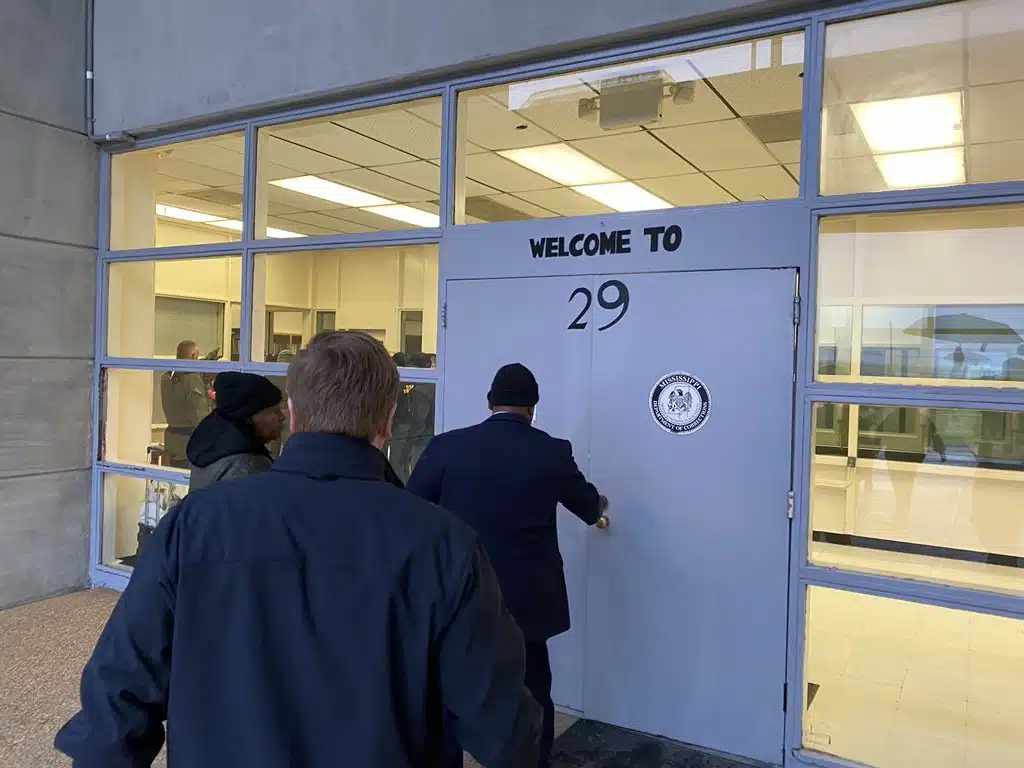
There have been at least eight homicide deaths inside prison facilities during Cain’s tenure – four deaths from blunt force trauma, two stabbings, one from a lung clot and one from thermal injuries, according to records from the State Medical Examiner’s Office.
The data does not include the Sept. 7 stabbing of 23-year-old Raymond Coffey at Parchman, which is believed to be gang-related.
“We’re trying to get home to our families and get people home to their families,” Andrico Pegues, who is incarcerated at the Alcorn County Regional Correctional Facility in Corinth and spent time this year in Parchman’s Unit 29, told Missisisppi Today in a phone call.
More often than not, a majority of inmates die in Mississippi prisons of natural causes. Cancer is the top natural cause of death, according to data from the State Medical Examiner, followed by heart attacks, strokes, lung conditions and liver and kidney diseases.
Disability Rights Mississippi, which has the ability to go inside and investigate the state’s prisons and jails, said it often sees people denied medical and mental health care and accessibility services.
“We’re not seeing really significant improvements on things that incarcerated individuals need,” said Greta Kemp Martin, Disability Rights Mississippi’s litigation director. She is also the Democratic candidate for attorney general.
Disability Rights filed a federal lawsuit in 2021 against MDOC’s medical provider VitalCore Health Strategies and Cain alleging they don’t provide adequate medical and mental health care. The lawsuit is ongoing, and in court records, MDOC and VitalCore have denied the allegations.
MDOC’s COVID-19 response: ‘We made the right decision’
The COVID-19 pandemic has also claimed lives inside Mississippi’s prisons.
At the onset of the pandemic in March 2020, MDOC suspended transfers from all county jails and visitation at all facilities, with exceptions only for attorneys and essential visitors.
By next month, the prison system reported a COVID-19 death: a Parchman inmate with underlying health conditions who had symptoms. The department responded by isolating affected areas, giving close contacts face masks, increasing screening and sanitizing frequently touched areas.
Some family members said officials weren’t doing enough to keep incarcerated people safe.
In May 2020, the Mississippi Center for Justice, MacArthur Justice Center and ACLU of Mississippi filed a class action suit against MDOC for inadequate response to COVID-19 at the Central Mississippi Correctional Facility in Pearl and South Mississippi Correctional Institution in Leakesville. They reached an agreement with MDOC on the grounds the department would implement safety protocols.
By January 2021, MDOC had about 1,380 COVID-19 positive inmates across the system, which Cain noted was better than how other prison systems were faring. He pointed to reporting by The Marshall Project that ranked Mississippi as the 10th safest prison system for only having 21 COVID-19 deaths and 21st for COVID-19 deaths nationwide.
“This is proof that we made the right decision in immediately buying, installing and using sanitization equipment in every area of our prisons as quickly as we could,” Cain said in a 2021 statement. “The temptation had been to wait on thousands of kits to test 17,000 inmates but testing and results would have taken weeks during which the virus could have spread like wildfire.”
SMCI had nearly 400 total COVID-19 cases between early 2020 and June 2022, according to reports released by MDOC online during the pandemic. Next was George/Greene County Correctional Facility with 235 cases, CMCF with 156 cases, Carroll/Montgomery County Regional Correctional Facility with 123 cases and Parchman with 113 total cases.
MDOC’s last online update of confirmed COVID-19 cases is dated June 9, 2022.
Janice Curtis, vice president of Mississippi Dreams Prisoner Advocacy, credited the wardens for taking people to the medical unit or into quarantine if they were exposed to the virus. She also credited Cain for being transparent about the number of active and cumulative cases on MDOC’s website and an effort was made to update the numbers.
The COVID Behind Bars Data Project at UCLA Law School, which tracked cases in state and federal jails, prisons, immigration detention centers and youth facilities, gave Mississippi an F based on how accessible its COVID-19 data was. The project noted that MDOC’s data didn’t include deaths from the virus or count how many staff were infected or died.
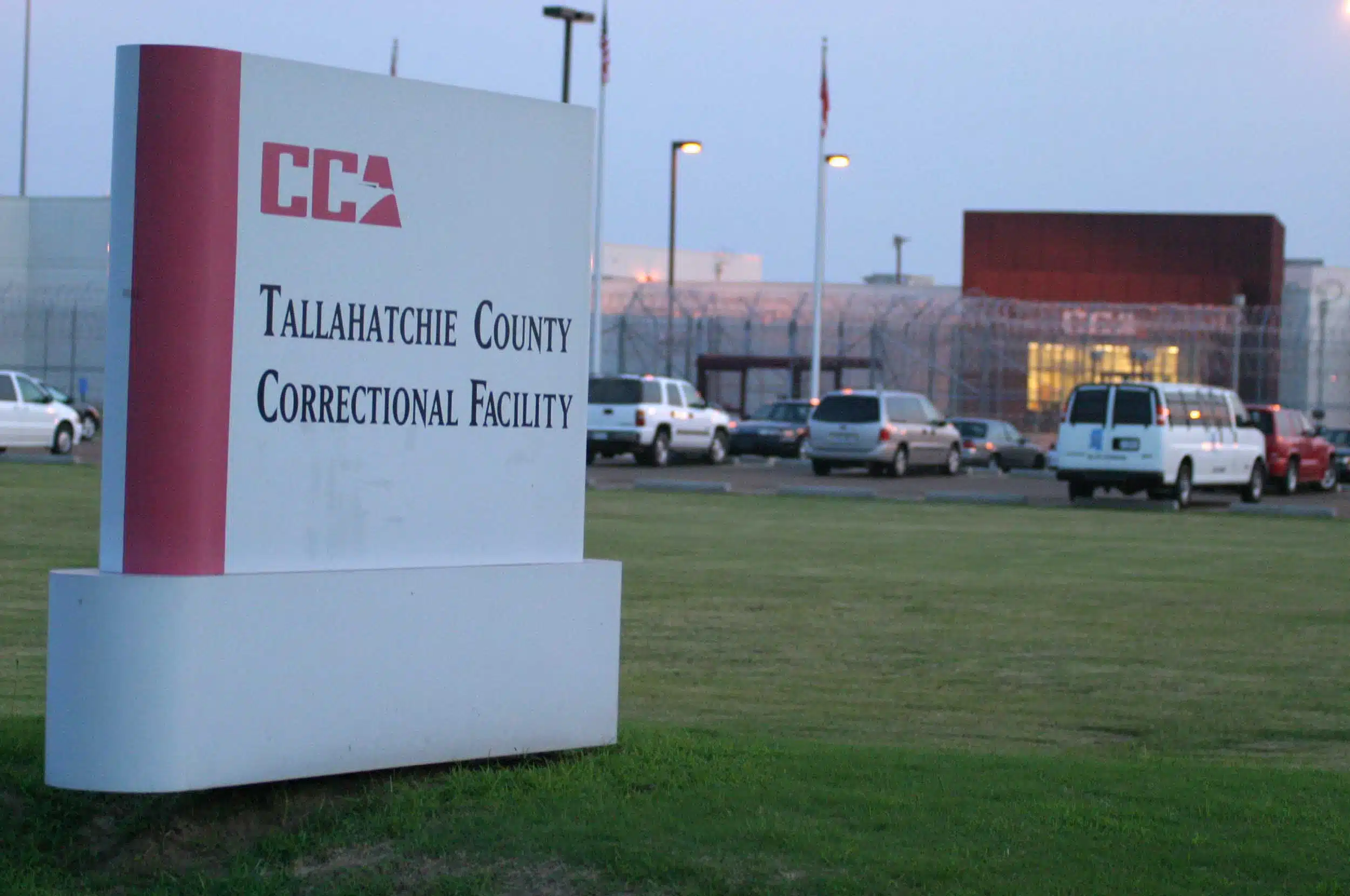
The department’s data may not have been the most accurate. Around August 2020 at the private Tallahatchie County Correctional Facility run by CoreCivic, MDOC reported 14 cases even though nearly 150 of the more than 200 Vermont inmates housed there tested positive for the virus when they returned from Mississippi, prompting Vermont prison officials to seek testing for the rest of the state’s inmates in Mississippi.
MDOC began vaccinating people at CMCF in March 2021, one of the first states to do so. Officials said prisoners could decline the vaccine, but documents obtained by Mississippi Today showed refusal could result in loss of privileges, such as visitation and participation in activities.
By September 2021, 89% of the prison population was fully vaccinated.
With inadequate training, ‘you’re going to have chaos’
Perhaps the biggest, and most ongoing challenge, facing Cain at MDOC has been inadequate staffing.
A 2021 report by the Justice Department found that staffing and a lack of supervision threaten the safety of Parchman inmates and staff.
The prison has been operating at half staff since at least 2018, according to the DOJ report. In February 2020, the prison’s overall staffing vacancy was 47% and 52.9% specifically for correctional officers.
Understaffing exists across the prison system. About two-thirds of the authorized security positions are filled at CMCF and about 70% at SMCI, according to MDOC’s 2021 annual report, the most recent available.
How well-trained staff is adds to the already untenable situation.
“If you don’t train the correctional officers to do and know the job, you’re going to have chaos. You will not have control over the situation,” said Anthony Allen, a former correctional officer at Stone County Correctional Facility, which houses state and county inmates.
He said a lack of adequate training hinders staff and inmate safety, and it makes some open to inmate manipulation and later involvement in bringing in contraband.
Cain needed to get more people to work in the prison system, so he made changes, such as lowering the hiring age for correctional officers and raising salaries to attract and retain staff.
Last year, MDOC announced 10% salary increases for current correctional officers and case managers and increases in base pay for new employees. This brought the starting salary for corporal officers to $36,000, $40,000 for sergeants, $42,000 for captains and over $47,000 for majors. There were also benefits packages.
Even with raises, Mississippi remains among the states with the lowest annual mean wage for correctional officers and jailers, according to data from the U.S. Bureau of Labor Statistics.
CMCF now has the largest population of inmates compared to Parchman. MDOC is focusing its staffing efforts in the Jackson metro area because it’s not as easy to attract people to work in the Delta.
Cain said inmates who abuse staff are sent to the Walnut Grove Correctional Facility in Leake County, which he says has helped lower staff violence and help staff feel safe at work.
‘We got to keep drugs out of the prisons’
The presence of gangs and contraband are a threat to Parchman’s safety, the DOJ said in its report.
In a six-month period, 630 cellphones, 555 shanks, pints of alcohol, pounds of tobacco, marijuana and various other drugs were confiscated from inside Parchman, which in its report, the DOJ said points to staff involvement.
Cain said contraband such as drugs and cellphones cause violence, but incarcerated people have used phones to inform the outside world about problems going on inside, such as during the 2020 riots.
To combat phones, Cain wants Congress to pass a law to allow Missisisppi to jam cellphone signals in the prison like the federal prisons are able to do.
Cain has said gang members extort other inmates and their family members. They have used their power to get contraband into the prison, he said, and the gangs are responsible for much of the violence against other inmates and staff.
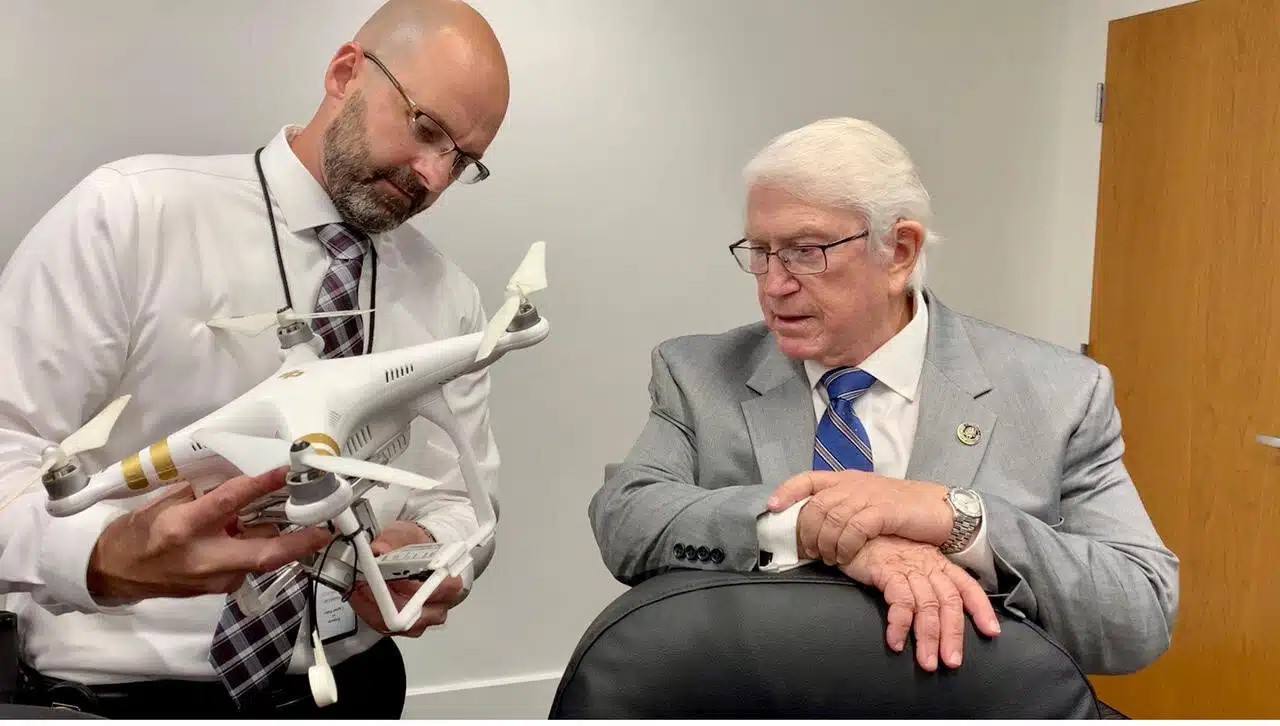
MDOC has investigated and fired staff from various MDOC facilities found to be smuggling in drugs and other contraband.
Cain is especially cautious about who works at Walnut Grove because it is where gang members are sent. He said anyone who wants to work there has to take a polygraph test and they are asked if they are affiliated with a gang. As with any prison, they can’t work at Walnut Grove if they previously have brought drugs into a prison facility.
The presence of drugs inside the walls also jeopardizes the drug treatment MDOC makes available to inmates, Cain said.
“Addiction is a big deal,” he said, noting how many in the prison system struggle with it. “For addiction (treatment) to really work, we got to try to do everything in our power to keep drugs out of the prisons.”
Amid DOJ probe, lawsuits, state pumps money into MDOC
State leaders, lawmakers and the community were looking to Cain to quell the violence and transform prison culture.
One way to support that task was by increasing the department’s budget. Between 2014 and 2020, MDOC’s budget was cut by $215 million, the Mississippi Center for Investigative Reporting reported.
Rep. Kevin Horan, chairman of the House’s Corrections Committee, said when Cain arrived, he may not have realized how underfunded MDOC was. Leadership and the Governor’s Office realized, with the DOJ investigating its prisons, the department’s budget should be increased to address issues and prevent future lawsuits.
MDOC’s Fiscal Year 2021 budget appropriation was nearly $311 million and appropriations have risen each year to the most recent appropriation of about $450 million, according to the Legislative Budget Office. The department received additional money from special fund appropriations and other sources.
With an increased budget, MDOC has been able to spend more on its prison facilities each year since Cain has been commissioner, according to the department budgets since Fiscal Year 2021.
Cain said MDOC used $19 million to restore Parchman, notably cleaning up and fixing cells inside Unit 29, and the roof is being fixed. He said a new death row is expected to open in a year and a half.
The most recent Mississippi State Health Department inspection of Parchman completed in September 2022 documented backed- up shower drains, running or leaking toilets, lights out, mold and pests in various housing cells. Similar issues were found in other housing units and inspections from 2020 and 2021.

Former MDOC staff and incarcerated people interviewed by Mississippi Today say these conditions are a violation of peoples’ constitutional rights.
Larry Waldon, incarcerated at the Holmes/Humphreys County Correctional Facility in Lexington, has advocated for reform while in prison, including through Mississippi Prison Reform Advocates.
Several weeks ago, he and a dozen other incarcerated people spoke with Mississippi Today on a group call where they shared a fraction of their experiences in the prison system and what kind of change they would like to see.
They talked about brown drinking water. One remembered not being able to sleep in the summer because of the mosquitoes. They witnessed violence among inmates and by staff.
Waldon wonders how incarcerated people at various MDOC facilities live in the conditions they do despite the millions the department receives from taxpayers.
“Inmates can’t tell the difference that you (the commissioner) have done things that are positive,” he said.
These are similar to the health and safety conditions that in 2020 caught the attention of rappers Jay-Z and Yo Gotti, who through Roc Nation filed two federal lawsuits on behalf of Mississippi prisoners and demanded state officials to fix Parchman or close the prison.
The lawsuits were dismissed in January after the inmates’ attorneys and MDOC said improvements have been made during the past three years, but the entertainers promised to continue to hold MDOC accountable and work toward long-lasting change that protects inmate safety.
Isolate problem inmates
Under Cain, two prison buildings have been refurbished and reopened to house maximum security inmates, those undergoing drug and alcohol treatment and women inmates.
A federal lawsuit closed the privately run Walnut Grove Correctional Facility in 2016, which a federal judge described as a “picture of such horror as should be unrealized anywhere in the civilized world.” It housed people convicted for serious crimes when they were children.

Cain saw a new use for the facility: alcohol and substance addiction programs on one side and on the other, a maximum-security facility for gang members, those who attack corrections staff and those who extort others.
In an interview, Cain said the facility is modeled after Angola’s disciplinary unit, the now-closed Camp J, and he said it is having a similar effect to help ease violence. Cain said the goal of isolating problem inmates is to protect the majority who are trying to stay out of trouble and better themselves.
“If you can’t peacefully co-exist, go live by yourself,” he said about sending people to Walnut Grove.
Cain said Walnut Grove has also helped reduce the prison-wide gang population from 6,400 when he took office to 1,400 more recently.
However, some former prison staff members and current inmates interviewed by Mississippi Today don’t see Walnut Grove as a complete solution. The DOJ said in its 2021 report that the strategy of sending gang leaders away isn’t a comprehensive strategy because a new leader will emerge to replace them.
The next facility to reopen was Delta Correctional Facility, a women’s facility in Greenwood that was a private prison and closed in 2012.
By the end of 2022, most of the women were moved to Delta Correctional. The move put women further away from their families and into an area lacking adequate health care options, particularly for gynecological care.
Women had been exclusively housed at CMCF since the early 2000s separate from the men, but last year had to leave their longtime space in the 1A Yard to go to 720, a men’s unit – a decision the women protested. Cain said the move was meant to limit interaction between the men and women.
As of October, there are about 330 women at Delta and about 850 at CMCF, according to MDOC records. In an interview, Cain said the two women’s facilities satisfy a need for additional space.
“That’s why it was just time (to open Delta) to anticipate in the next 15 years or so we’d have more women, so might as well divide it and conquer it right now,” he said.
Cain’s four pillars for fixing prisons
In his 2020 confirmation hearing, Cain described four main tenets to fixing the prison system: good food, good medicine, good playing and good praying.
He went on to say that he wanted to build churches in the state’s prisons and start ministry programs like at Angola. That promise was realized this summer when a chapel at the women’s unit at CMCF opened for services.
Cain said there are plans to place churches at SMCI and Parchman through private donations, which is how the first church was built.
In Mississippi’s prisons, inmates can earn a seminary degree from New Orleans Baptist Theological Seminary and become chaplains. Senior U.S. District Judge Keith Starrett, who has long advocated for prison reform, said, through spiritual programs, work and character components, Cain is helping people build new habits and lifestyles with accountability.
Another path inmates may take to improve themselves is education.
The state prisons and regional facilities have high school diploma programs. Some offer college level courses through the Prison-to-College Pipeline Program by the University of Mississippi, and Mississippi Valley State University is the first HBCU to offer a prison education program.
Kerry Gipson, who is incarcerated at the Holmes/Humphreys County Correctional Facility, wants to see more classes and educational programs. The commissioner talks about bringing programs across the prison system, “but (they are) not everywhere like he promised,” Gipson said.
Lead by example
In his nearly four years as commissioner, Cain has focused on skilled job training programs that he said he believes will give people careers after prison.
He plans to ask the Legislature to expand a work release program, following success from the pilot last year that operated through the Rankin County Sheriff’s Office. He said none of the participants returned to prison and they were able to go home with $2,000 in their pockets.
Cain said he wants to lead by example and encourage business owners to hire formerly incarcerated people, which is what he did for chaplains and other MDOC staff. Among them is George King, who served 25 years at Angola for manslaughter and now is the MDOC’s statewide program director.
Through MDOC’s job training schools, inmates can learn to drive and pour concrete trucks. They can train to be a commercial truck driver through a simulator. They learn to weld in a mobile unit that travels among the prisons. Cain wants people to walk out with certifications and licenses.
While women can also participate in those programs, there are also some specifically for them, such as the cosmetology school that opened last month at Delta Correctional.
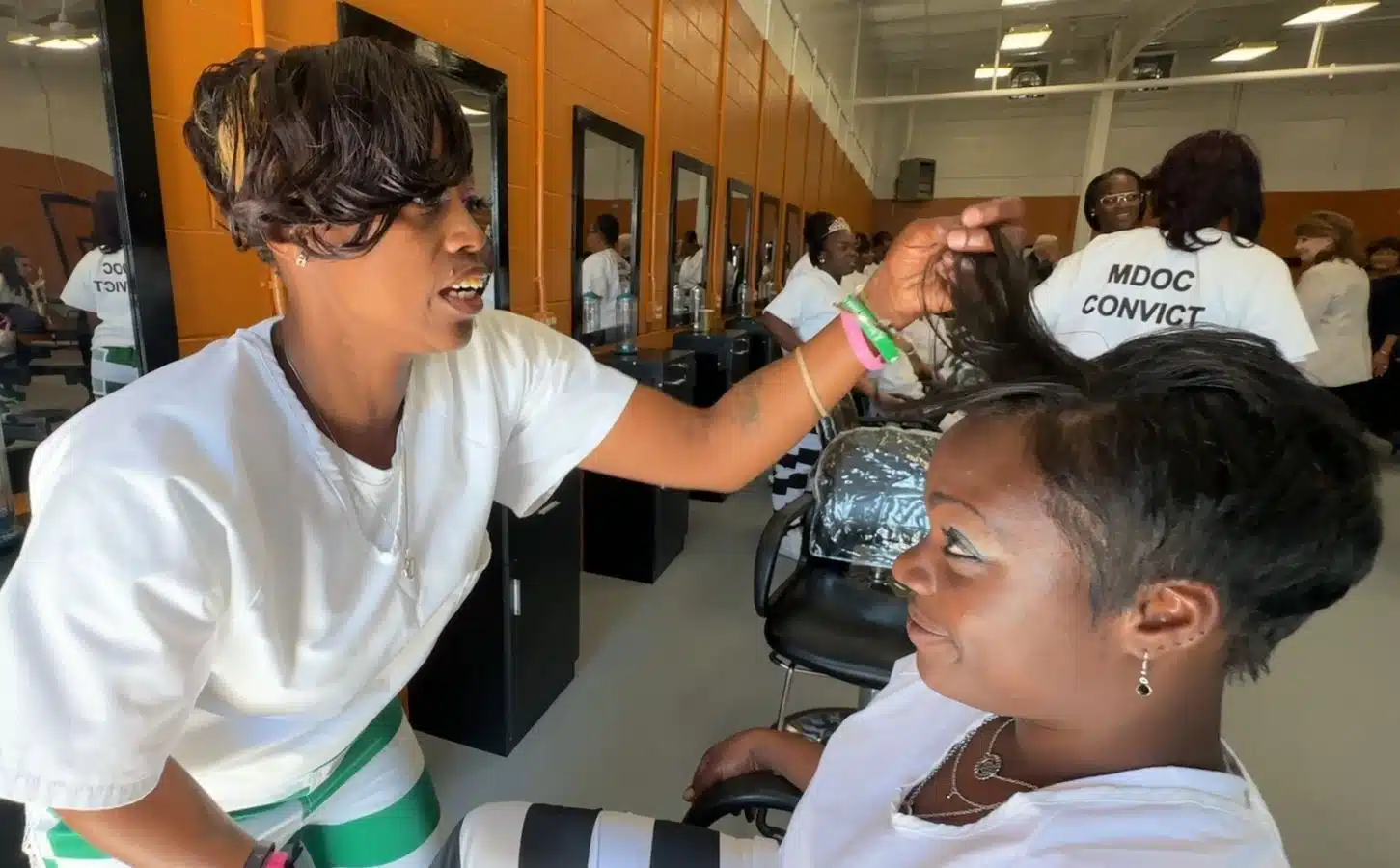
In the spring, nearly 30 women close to release at the Flowood Community Work Center graduated from a health services program – MDOC’s first reentry program at the center.
The commissioner doesn’t think the men have better job opportunities available to them than the women. Women can join the programs from traditionally male-dominated, better-paying industries, he said. They just need the motivation to go into those fields and learn different skills.
Curtis, of Mississippi Dreams Prisoner Advocacy, said that barrier still exists, and often it seems that the women don’t get as many options to better themselves.
Can one person fix Mississippi’s prisons?
Cain sees job training, education and morality as the pillars of reentry – the way to reduce recidivism and the taxpayer’s burden to fund the prison system.
Judge Starrett said he has learned that you can’t send someone to prison for a few years and expect them to change their lives. Seeing Cain focus on skills training and reentry reinforces his view that the commissioner is doing the right thing.
It took a year to get the training schools running, and the commissioner hopes the Legislature will support his request for more programs. The process has been slow, and Cain said he’s in a hurry to do more – prevent people from returning and from there being new crime victims.
“We’re taking in several thousand people this last year and several thousand people left. They left unprepared. We’re failing” he said. “We got to have them prepared so they don’t fail, so I’m in a hurry for their sake.”
Incarcerated people and advocates, however, don’t see the state’s reentry efforts as enough.
Tomon Clark, who is incarcerated at the Washington County Regional Correctional Facility in Greenville, said he and others don’t have the same access to job training programs like there are at the prisons.
He also wants to see more at his regional facility to prevent people from sitting around and learning to become better criminals.
“You can’t rehabilitate them if there’s not opportunity,” he said by phone.
Kemp Martin has had clients through Disability Rights Mississippi who want to work or attend school, but she said they are discouraged from participating because they have mobility challenges, and they would need to get a prison staff member to take them to the programs.
“I don’t care how much training you give someone or how set up for a job they are afterward,” she said. “If while they are incarcerated they languish, they are not treated for medical issues they have and they are not given mental health treatment, they are not fully set up for success.”
Meanwhile, Mississippi leads the world in mass incarceration. Since May 2022, the prison population has been above 19,000 – an increase from the population low of around 17,000 MDOC reached during the COVID-19 pandemic.
Advocates are looking for solutions to ease the prison population, such as sentencing reform, supporting a functioning indigent public defense system and parole.
Can Mississippi’s prisons be fixed by one person? Not everyone thinks so.
“There are so many systemic things wrong with MDOC,” said Paloma Wu, from the Mississippi Center for Justice. “I don’t think any one commissioner can come in and have a huge dent.”
This article first appeared on Mississippi Today and is republished here under a Creative Commons license.
Crooked Letter Sports Podcast
Podcast: The Mississippi Sports Hall of Fame Class of ’25
The MSHOF will induct eight new members on Aug 2. Rick Cleveland has covered them all and he and son Tyler talk about what makes them all special.
Stream all episodes here.
This article first appeared on Mississippi Today and is republished here under a Creative Commons Attribution-NoDerivatives 4.0 International License.
The post Podcast: The Mississippi Sports Hall of Fame Class of '25 appeared first on mississippitoday.org
Mississippi Today
‘You’re not going to be able to do that anymore’: Jackson police chief visits food kitchen to discuss new public sleeping, panhandling laws
Diners turned watchful eyes to the stage as Jackson Police Chief Joseph Wade took to the podium. He visited Stewpot Community Services during its daily free lunch hour Thursday to discuss new state laws, which took effect two days earlier, targeting Mississippians experiencing homelessness.
“I understand that you are going through some hard times right now. That’s why I’m here,” Wade said to the crowd. “I felt it was important to come out here and speak with you directly.”
Wade laid out the three bills that passed earlier this year: House Bill 1197, the “Safe Solicitation Act,” HB 1200, the “Real Property Owners Protection Act” and HB 1203, a bill that prohibits camping on public property.
“Sleeping and laying in public places, you’re not going to be able to do that anymore,” he said. “There’s a law that has been passed that you can’t just set up encampments on public or private properties where it’s a public nuisance, it’s a problem.”
The “Real Property Owners Protection Act,” authored by Rep. Brent Powell, R-Brandon, is a bill that expedites the process of removing squatters. The “Safe Solicitation Act,” authored by Rep. Shanda Yates, I-Jackson, requires a permit for panhandling and allows people to be charged with a misdemeanor if they violate this law. The offense is punishable by a fine not to exceed $300 and an offender could face up to six months in jail. Wade said he’s currently working with his legal department to determine the best strategy for creating and issuing permits.
“We’re going to navigate these legal challenges, get some interpretations, not only from our legal department, but the Attorney General’s office to ensure that we are doing it legally and lawfully, because I understand that these are citizens,” he said. “I understand that they deserve to be treated with respect, and I understand that we are going to do this without violating their constitutional rights.”
Wade said the Jackson Police Department is steadily fielding reports of squatters in abandoned properties and the law change gives officers new power to remove them more quickly. The added challenge? Figuring out what to do with a person’s belongings.
“These people are carrying around what they own, but we are not a repository for all of their stuff,” he said. “So, when we make that arrest, we’ve got to have a strategic plan as to what we do with their stuff.”
Wade said there needs to be a deeper conversation around the issues that lead someone to becoming homeless.
“A lot of people that we’re running across that are homeless are also suffering from medical conditions, mental health issues, and they’re also suffering from drug addiction and substance abuse. We’ve got to have a strategic approach, but we also can’t log jam our jail down in Raymond,” Wade said.
He estimates that more than 800 people are currently incarcerated at the Raymond Detention Center, and any increase could strain the system as the laws continue to be enforced.
“I think there’s layers that we have to work through, there’s hurdles that we are going to overcome, but we’ve got to make sure that we do it and make sure that my team and JPD is consistent in how we enforce these laws,” Wade said.
Diners applauded Wade after he spoke, in between bites of fried chicken, salad, corn and 4th of July-themed packaged cakes. Wade offered to answer questions, but no one asked any.
Rev. Jill Buckley, executive director of Stewpot, said that the legislation is a good tool to address issues around homelessness and community needs. She doesn’t want to see people who are homeless be criminalized, but she also wants communities to be safe.
“I support people’s right to self determine, and we can’t impose our choices on other people, but there are some cases in which that impinges on community safety, and so to the extent that anyone who is camping or panhandling or squatting and is a danger to themselves and others, of course, I fully support that kind of law. I don’t support homelessness being criminalized as such,” Buckley said.

Many of the people Wade addressed while they ate Thursday said they have housing, don’t panhandle, and shouldn’t be directly impacted by the legislation. But Marcus Willis, 42, said it would make more sense if elected officials wanted to combat the negative impacts of homelessness that they help more people secure employment.
“There ain’t enough jobs,” said Willis, who was having lunch with his girlfriend Amber Ivy.
The two live in an apartment together nearby on Capitol Street, where Ivy landed after her mother, whom Ivy had been living with, suffered a stroke and lost the property. Similarly, Willis started coming to eat at Stewpot after his grandmother, whose house he used to visit for lunch, passed away.
Willis holds odd jobs – cutting grass, home and auto repair – so the income is inconsistent, and every opportunity for stable employment he said he’s found is outside of Jackson in the suburbs. The couple doesn’t have a car.
Making rent every month usually depends on their ability to find someone to help chip in, said Ivy, who is in recovery from substance abuse. She said she’s watched problems surrounding homelessness grow over the years in Jackson. Ivy grew up near Stewpot and has lived in various neighborhoods across the city – except for the times she moved out of state when things got too rough.
“There was just moments where I just had to leave,” Ivy said. “Sometimes if you hit a slump here, there’s almost no way for you to get out of it.”
This article first appeared on Mississippi Today and is republished here under a Creative Commons Attribution-NoDerivatives 4.0 International License.
The post 'You're not going to be able to do that anymore': Jackson police chief visits food kitchen to discuss new public sleeping, panhandling laws appeared first on mississippitoday.org
Note: The following A.I. based commentary is not part of the original article, reproduced above, but is offered in the hopes that it will promote greater media literacy and critical thinking, by making any potential bias more visible to the reader –Staff Editor.
Political Bias Rating: Center-Right
This article primarily reports on new laws in Jackson, Mississippi, targeting public sleeping, panhandling, and squatting, focusing on statements by Police Chief Joseph Wade and community perspectives. The coverage presents the legislative measures—authored by Republican and independent lawmakers—with a tone that emphasizes law enforcement challenges and community safety, reflecting a conservative approach to homelessness as a public order issue. While it includes voices concerned about criminalization and the need for social support, the overall framing centers on law enforcement and property protection. The article maintains factual reporting without overt editorializing but leans slightly toward a center-right perspective by highlighting legal enforcement as a solution.
Mississippi Today
Medicaid cuts could be devastating for the Delta and the rest of rural America
Note: This story first published in Stateline, which is part of States Newsroom, the nation’s largest state-focused nonprofit news organization.
LAKE PROVIDENCE, La. — East Carroll Parish sits in the northeastern corner of Louisiana, along the winding Mississippi River. Its seat, Lake Providence, was a thriving agricultural center of the Delta. Now, the town is a shell of its former self. Charred and dilapidated buildings dot the small city center. There are a few gas stations, a handful of restaurants — and little to no industry.
Mayor Bobby Amacker, 79, says at one point “you couldn’t even walk down the street” in Lake Providence’s main business district because “there were so many people.”
“It’s gone down tremendously in the last 50 years,” said Amacker, a Democrat. “The town, it looks like it’s drying up. And it’s almost unstoppable, as far as I can tell.”
Now, East Carroll residents stand to lose even more. Like many people in Louisiana, they received a lifeline when the state expanded Medicaid to more low-income adults in 2016. Expansion drove Louisiana’s uninsured rate to the lowest in the Deep South, at 8% in 2023 for working-age adults, according to state data, despite it having the highest poverty rate in the U.S. that year.
This week, both chambers of Congress approved President Donald Trump’s “big, beautiful” tax and spending bill. It includes more than $1 trillion in cuts to Medicaid, the joint state-federal health insurance program for poor families and individuals, to help pay for tax cuts that mostly benefit the rich. The legislation would cause 11.8 million more Americans to become uninsured by 2034, according to the Congressional Budget Office.
The bill includes new work rules for Medicaid recipients and would require them to verify their eligibility more frequently. It also would limit a financing strategy that states have used to boost Medicaid payments to hospitals.
Republicans say enrollees are taking advantage of the Medicaid program and getting benefits when they shouldn’t be. They say the program costs too much and states are not paying their fair share.
The Delta region, which includes communities in both Louisiana and Mississippi, would suffer under such large cuts. But in Louisiana — where almost half of the state depended on Medicaid in 2023, the Louisiana Department of Health reported — the cuts could be ruinous. Louisiana could lose up to $35 billion in federal Medicaid support over the next decade, according to KFF, a health policy research group. Mississippi, which never expanded Medicaid, could still lose up to $5 billion.
Residents are watching with apprehension, fear and, sometimes, anger, wondering how Congress could be so blind to how much they are struggling.
“If they take that away from us and everyone that really needs it, that’s going to be bad,” said Sherila Ervin, who lives 20 minutes up the road from Lake Providence in Oak Grove and has Medicaid coverage.
Medicaid work requirements and other health care provisions in the bill ignore the reality of living in poorer rural communities, where people struggle to find the jobs, transportation and internet access required to meet the rules, according to interviews with people and providers in the Delta region.
Even though Louisiana and Mississippi have taken very different approaches to Medicaid — one expanded eligibility under the 2010 Affordable Care Act and the other didn’t — both rely heavily on the program to sustain access to medical care for all their residents.
On a hot summer day in June, Ervin walks into the bare-bones 99-cent store in downtown Lake Providence. As she looks over some clothing, she says she’s heard about the potential Medicaid cuts. But she hadn’t heard about the work requirements, and is shocked they’re even on the table.
“I don’t like that. I don’t think they should put a stipulation on that,” Ervin says, exasperated that she would have to report her work hours. It’s hard enough as it is, she says, to thrive in this community.
READ MORE: In the Deep South, health care fights echo civil rights battles
Ervin, 58, has been working at Oak Grove High School in the cafeteria, serving hot plates to children for two decades. She says it’s one of the good, steady jobs available in this area, but her income is only around $1,500 per month.
Ervin’s job offers health benefits, but she can’t afford the premiums on her salary. She relies on Medicaid for care, including medications for her high blood pressure.
In East Carroll Parish, around 46.5% of people live below the poverty level, meaning the area is overwhelmingly poor, at over four times the national poverty rate, with a median income of $28,321. For Black households, the figure is a mere $16,690.
Expansion was a lifeline for people such as Ervin. Louisiana offers Medicaid to people who earn below 138% of the federal poverty line — currently about $22,000 a year for an individual.
“Sometimes you can work, but then when you work, you still can’t pay to get help,” Ervin said.
It’s a similar economic situation an hour away across the river. Poverty is about three times the national rate in Washington County, Mississippi, where residents in the city of Greenville lament the consequences of not being able to avoid destructive medical debt, which can keep them stuck in a cycle of gig work and of living paycheck to paycheck.
Greenville, the county seat, is among the fastest-shrinking cities in the U.S. It’s still one of the larger rural cities in Mississippi, with coffee shops, restaurants, hotels, a regional hospital and several big-box stores. But the downtown has just a few small businesses and a bank, and residents say jobs are hard to find.
Greenville resident April McNair, 45, remembers giving birth 17 years ago, long before Mississippi extended postpartum Medicaid to a full year. She had Medicaid coverage during pregnancy, but was kicked off shortly after giving birth, despite having post-delivery complications.
The result was a trip to the emergency room and a $2,500 bill she couldn’t cover. Right after giving birth, McNair looked for work. She said potential employers often told her that she was overqualified because she had a master’s degree.
“I had to kind of figure out how to make my ends meet,” McNair said. “I ended up with a significant bill, all because I did not have Medicaid.”
McNair feels like Mississippi leaders are making a mistake by continuing to reject full Medicaid expansion.
“That’s a selfish move. To me, they’re selfish,” McNair said, adding that now she’s worried for neighbors in Louisiana who may lose the lifeline she wishes she had.
“God forbid, hypothetically speaking, what if one of them meets their demise because of this bill that [Congress] passed?”
Hard to thrive
Mississippi experienced its first taste of equalized access to medicine in the late 1960s.
Delta Health Center, the first federally funded health center in the nation, opened during the peak of the Civil Rights Movement in the all-Black town of Mound Bayou, about an hour north of Greenville. The center vowed to care for anyone regardless of race or ability to pay in a region plagued with poverty, poor health and discrimination — and continues to do so to this day.
It was a significant opportunity for generations of African Americans who had gone without health care, in a place where people had no access to clean drinking water, running sewage systems or even food, said Robin Boyles, chief program planning and development officer at Delta Health Center.
But it wasn’t easy for the clinic to mobilize support, even though it was clearly needed. Before its opening, it faced pushback from politicians and even doctors. In a 1966 clipping from a local newspaper, the white-owned Bolivar Commercial, the editorial board railed against the new clinic, saying it would “lead further to socialized medicine.”
The situation is certainly better in Mississippi and Louisiana than it was in the 1960s, but critics say the Medicaid cuts could reverse hard-fought progress.
People who live in the Delta are fiercely proud of their communities, but conditions there make it hard to thrive.
Black residents, who are the overwhelming majority, have had a particularly hard time. After the Civil War, many were relegated to sharecropping of cotton and corn for subsistence. Meanwhile, an elite white class of plantation owners and investors amassed enormous amounts of wealth.
A 2001 report from the U.S. Commission on Civil Rights described the area as one with “limited economic resources; inadequate employment opportunities; insufficient decent, affordable housing; and poor quality public schools.”
“We have a lot of patients that are one health issue away from either being out of a job or being bankrupt because of a trip to the emergency room,” said Dr. Brent Smith, a physician at a primary care clinic at Delta Health System in Greenville.
Even some of the most vulnerable people, such as new moms in Mississippi, still struggle to get basic care, in part because the state has left billions of dollars in federal funding for Medicaid expansion on the table, said Dr. Lakeisha Richardson, an OB-GYN at Delta Health System.
“There are a lot of maternal [care] deserts in Mississippi where women have to travel 60 miles or more just to get prenatal care and just to get to the closest hospital for delivery,” Richardson said. “And I don’t see that getting any better in Mississippi and in rural areas.”
Richardson says nearly all her patients are working moms, many of whom would really benefit from having Medicaid expansion.
“America doesn’t realize that there are people out here struggling for no reason of their own,” she said.
That’s why Medicaid expansion in Louisiana in 2016, much like the community health center movement in Mississippi, was a bright spot in the rural South, said Smith.
“Louisiana expanded Medicaid, a surprising move in the South to see any state expand,” Smith said. “They saw it for what it was, which was a very real opportunity to assist this specific group of patients.”

In Mississippi, 20 rural hospitals are at immediate risk of closure, according to a recent report, more than double the number at risk in Louisiana. In many cases, Medicaid is the largest and most reliable payer for rural hospitals. While Louisiana’s overall uninsured rate plummeted to 8.3% by 2023, in Mississippi it was 10.5%.
“Unlike a lot of our Southern peers, we have not had the same level of closures of facilities,” said Courtney Foster, senior policy adviser for Medicaid, with the nonprofit Invest in Louisiana.
“Medicaid was like a real lifeline for people in transition. Oftentimes it was people who had lost their jobs and were just looking to get back on their feet.”
Now, the new work and reporting requirements could put that progress at risk.
In East Carroll Parish, finding a job — let alone a good-paying one with health benefits — is difficult, says Rosie Brown, executive director at the East Carroll Community Action Agency, a nonprofit that helps low-income people with their rent and utility bills. Many of the jobs available in town pay minimum wage, just $7.25 an hour.
Brown loves living in Lake Providence; this is where her family is. She doesn’t want to move but wishes the government would invest more in her community — not take away benefits that help people who are hanging on by a thread.
“We have one bank. We have one supermarket,” she said. “Transportation isn’t easy either.”
Local infrastructure is so limited, she’s even heard of some people charging residents $20 for a ride to Walmart. Some people have to hitch a ride an hour away to go to work, she said.
“There’s nowhere to go,” Brown said.
Dominique Jones works at the local library, where she helps roughly 75 to 85 people per month apply for programs such as Medicaid and food assistance. Many of the residents she helps don’t have access to the internet or even a computer, a real barrier for people who’d be required to report their working hours to state Medicaid officials.
“This town right here is made up of a lot of old people that need Medicaid and Medicare. And without it, they wouldn’t have any kind of health care at all,” Mayor Amacker said.
Even a job in local government in Lake Providence doesn’t offer affordable health insurance.
Nevada Qualls, 25, sits across from Amacker’s office. She earns just $12 an hour as a cashier at city hall. The low pay means she qualifies for Medicaid expansion coverage, which is good because she can’t afford the premiums for private insurance.
“I feel like there should be a higher threshold for people that can get Medicaid, because they’re still struggling,” she said.
At the 99-cent store, school district worker Ervin wonders whether state and federal leaders understand what it’s like to live in her community, urging them to visit and see for themselves.
“They want to do stuff for the rich people that’s already rich,” she said. “What are they doing? It’s almost like there’s no common sense with them.”
‘The tremble factors’
While leaders in the U.S. Senate were working into the night this past weekend debating Trump’s tax and spending bill, Greenville resident Jennifer Morris was praying for the pain to stay away.
Morris, 44, has hemicrania continua, a headache disorder that causes constant pain on one side of her head. There’s no underlying trigger and no cure. Her doctors help her keep the pain to a minimum with regular treatments that include dozens of injections into her head.
“It doesn’t take the pain away,” she said during a late-night gathering in Greenville’s Greater Mount Olivet Missionary Baptist Church in June. “It does reduce the pain so that I’m able to function. But it’s rough.”
Morris is worried about the looming Medicaid cuts. She qualifies for Mississippi Medicaid because her condition counts as a disability, and she depends on the coverage to afford her medications.
Morris’ Medicaid may be safer than that of her Delta neighbors in Lake Providence, as some of the most dramatic Medicaid changes being considered — such as work requirements — target Medicaid expansion states only.
But Mississippi could be hurt by a provision in the Senate bill that would target a strategy states have used to boost the Medicaid dollars they get from the federal government.
Mississippi could see a major hit to its Medicaid funds, which “would be a tremendous decrease in revenue for the state,” harming “services and access to care,” says Mitchell Adcock, executive director at the Center for Mississippi Health Policy.
“It would be just the opposite of expansion. It would be a contraction for the Medicaid program in the state,” he said.
Leonard Favorite, a pastor who was attending the same event at Mount Olivet Church, as Morris, says he grew up on a plantation in Louisiana and worked his way out of poverty by joining the Air Force. This type of journey is hard, he said, when you’re already starting from so far behind. He thinks the “big, beautiful bill” will create more roadblocks for poor people.
READ MORE: Glaucoma-related vision loss is often preventable, but many can’t afford treatment
“You have people who are already living below the poverty line and they will certainly be submerged into poverty at unspeakable levels,” said Favorite, 70.“ That seems to be the trend of this administration from the point of view of looking from the outside.
“Poor people are beginning to feel the tremble factors of an administration that caters toward the rich.”
National researchers estimate that up to 132,000 Louisianans who gained health insurance under expansion could lose it under work rules.
But national reports that rely on census data likely underestimate the potential Medicaid losses. For example, while 2023 census data show 47% of East Carroll Parish was on Medicaid, state health data reviewed by Stateline and Public Health Watch suggests the number is more like 64%. Similarly statewide, census data showed about a third of Louisianans were on Medicaid. State data shows that percentage is closer to 46.5%.
Experts such as Joan Alker at the Georgetown Center for Children and Families say the undercounts nationally are a well-known issue among researchers, but it’s difficult to correct because the quality of state reporting can be so uneven.
State Medicaid funding is also at risk. For years, both Mississippi and Louisiana have relied on revenue generated through a financing tool — known as a provider tax — to draw down more federal dollars and boost Medicaid reimbursements to providers. But congressional Republicans hope to limit states’ ability to collect those taxes.
Depending on how Congress restricts provider taxes, Mississippi could lose hundreds of millions in federal Medicaid funding, crucial in a state with such a high uninsured rate, said Richard Roberson, president and CEO of the Mississippi Hospital Association.
“It’s unavoidable that when you’re taking that much money out of the system, that there’s not going to be some repercussions felt even in non-Medicaid expansion states like Mississippi,” Roberson said.
Last week, the Louisiana Hospital Association signed a statement calling the package of Medicaid cuts before Congress “historic in their devastation.”
From her small, sunny office in East Carroll Parish, nurse Jennifer Newton can’t understand the attacks on Medicaid.
Newton, who grew up one parish over in West Carroll, is executive director of the Family Medical Clinic, a community health center in Lake Providence and one of the few health providers in town. She says 50% of the clinic’s patients have Medicaid insurance.
Newton has worked in health care in the area for decades and watched as Medicaid expansion made it possible for more patients to access and afford health care they desperately needed, including preventive services. “It’s absolutely helped,” she said. “Absolutely.”
In 2015, the year before Louisiana expanded Medicaid, the uninsured rate among working-age adults in East Carroll Parish was nearly 35%. By 2021, that number was 12.7%.
“Why are we going back?” Newton asked. “We’ve made so much progress.”
Republican supporters of work requirements, including Louisiana representative and U.S. House Speaker Mike Johnson, argue they will encourage people to find jobs and ensure Medicaid goes to people who need it most. But according to KFF, a majority of Louisiana adults with Medicaid — 69% — already work.
Brian Blase, president of the Paragon Health Institute, a conservative policy group that is working with Republicans to formulate Medicaid cuts, is not concerned about eligible people losing coverage, as has happened under previous work requirement efforts. He says the bill has built in exceptions for certain people and requirements “can be met by not just work,” so “concerns seem pretty overstated.”
Medicaid recipients also can meet the requirement by volunteering or attending school for 80 hours per month.
“It’s hard for me to understand that there are areas in the country where there’s not jobs. There’s always work to be done,” Blase told Stateline. Blase said he believes Medicaid is “the government conditioning welfare for able-bodied working-age adults.”
But advocates and experts predict East Carroll, where internet access is notoriously bad, would experience results similar to when Arkansas instituted Medicaid work requirements in 2018: People disenrolled because of lack of awareness and confusion over the policy, as well as paperwork errors — not because they weren’t working enough.
“Unless the beneficiary can navigate that red tape, they’re going to lose coverage and become uninsured,” said Benjamin Sommers, a health economist at Harvard T.H. Chan School of Public Health.
Data shows Arkansas’ experiment did not increase employment, Sommers said, and instead led to more people reporting medical debt and delaying care because of cost.
‘Take a step back’
People in the Delta — where the legacy of government neglect and discrimination are all around — want politicians to visit their towns and see the barriers people face trying to improve their lives and stay healthy.
“People spent their lives uninsured,” said Amy Hale, a nurse practitioner at East Carroll Medical clinic. “Medicaid expansion allowed them to get in here and be treated.”
Lake Providence residents are scared they may find themselves in a similar situation as McNair and other people across the river in Greenville: working, uninsured, and too poor to access health care.
Recent estimates show up to 317,000 Louisianans could lose Medicaid health insurance under Trump’s tax bill. Nearly 33,000 in Mississippi.
“People are actually trying,” McNair said. “I really wish [lawmakers] would look at it from a different lens. What if it was their kid? Or they didn’t have the salaries they have now and your baby is ill. … Like really take a step back and think about what it is that you’re doing.”
This story is part of “Uninsured in America,” a project led by Public Health Watch that focuses on life in America’s health coverage gap and the 10 states that haven’t expanded Medicaid under the Affordable Care Act.
Stateline reporter Shalina Chatlani can be reached at schatlani@stateline.org. Public Health Watch reporter Kim Krisberg can be reached at kkrisberg@publichealthwatch.org.
This article first appeared on Mississippi Today and is republished here under a Creative Commons Attribution-NoDerivatives 4.0 International License.
The post Medicaid cuts could be devastating for the Delta and the rest of rural America appeared first on mississippitoday.org
Note: The following A.I. based commentary is not part of the original article, reproduced above, but is offered in the hopes that it will promote greater media literacy and critical thinking, by making any potential bias more visible to the reader –Staff Editor.
Political Bias Rating: Center-Left
The article presents a clear perspective sympathetic to low-income and rural communities affected by Medicaid cuts. It highlights the hardships faced by residents in Louisiana’s and Mississippi’s Delta regions, emphasizing poverty, limited job opportunities, and the critical role Medicaid plays in health access. While it reports Republicans’ arguments for work requirements and cost control, the language and framing focus more on the negative consequences of cuts and the struggles of vulnerable populations. This tone and focus suggest a center-left bias, favoring expanded social safety nets and critical of policies perceived to harm the poor.
-
News from the South - Arkansas News Feed6 days ago
Real-life Uncle Sam's descendants live in Arkansas
-
News from the South - Louisiana News Feed7 days ago
Her son faced 10 years behind bars; now she’s the one facing prison
-
News from the South - Arkansas News Feed7 days ago
Could roundabouts become more common than red lights?
-
News from the South - Georgia News Feed5 days ago
'Big Beautiful Bill' already felt at Georgia state parks | FOX 5 News
-
News from the South - Oklahoma News Feed6 days ago
LOFT report uncovers what led to multi-million dollar budget shortfall
-
News from the South - Alabama News Feed7 days ago
Alabama schools to lose $68 million in federal grants under Trump freeze
-
News from the South - Missouri News Feed7 days ago
Celebrate St. Louis returns with new Superman-themed drone show
-
News from the South - Tennessee News Feed6 days ago
Officers run for cover after man in car fired shots at them in Downtown Memphis
















